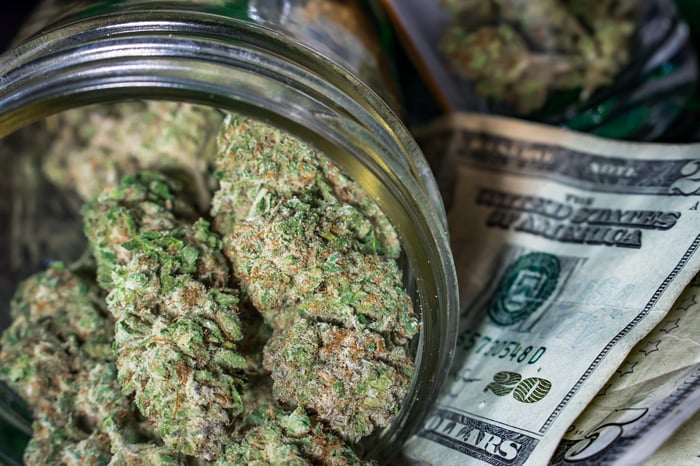Over the past three years, marijuana stocks have looked practically unstoppable. But since the beginning of May, they've proven quite fallible, with close to three dozen pot stocks declining by a double-digit percentage last month.
At the heart of investors' concerns are supply chain problems throughout North America. In Canada, a backlog of cultivation applications, coupled with a shortage of compliant packaging solutions, has kept growers from planting, harvesting, processing, or selling cannabis. Since the green flag waved in October on recreational weed sales, cannabis store revenue has mostly flatlined.
Meanwhile, in the United States, pot sales in key markets like California have been disappointing. A combination of high tax rates (which have coerced illicit production) and marijuana oversupply have produced tax revenue that's well below initial estimates.
Add these problems up, and it's no surprise to learn that Wall Street has been reducing 2020 earnings-per-share (EPS) estimates throughout the industry.
But there are always exceptions to the rule -- and in June, it's the following five small-cap pot stocks that have seen their profit projections rise, according to Wall Street.

Image source: Getty Images.
Trulieve Cannabis
Vertically integrated U.S. dispensary operator Trulieve Cannabis (TCNNF -3.64%) shouldn't be a big surprise on this list following the company's robust growth outlook offered in its first-quarter operating results press release. After generating just shy of $103 million in 2018 sales, the Florida-focused seed-to-sale operator has called for $220 million to $240 million in 2019 sales, and between $380 million to $400 million in 2020 revenue. As such, Wall Street's consensus of $0.74 per share in profit for 2020 is now $0.86 per share.
The secret to Trulieve's success has been staying close to the vest, so to speak. Headquartered in Florida, Trulieve has opened 28 of its 30 dispensaries in the Sunshine State. By focusing on a single, albeit lucrative, market, the company has been able to successfully build its brand and grab valuable market share -- and do so all while keeping its costs down.
Flowr Corp.
Another small-cap marijuana stock with increasing EPS estimates for 2020 is specialty grower Flowr Corp. (FLWPF). Flowr, which has been approved by the Securities and Exchange Commission to uplist to the Nasdaq from the over-the-counter exchange, had been expected to deliver 15 Canadian cents (CA$0.15) in full-year profits in 2020 three months ago. That's now been upped to an expectation of CA$0.20 per share.
What makes Flowr so special is the company's focus on genetics and production efficiency. Whereas most Canadian growers are fighting over which company can produce the most discount or average-quality cannabis, Flowr is specifically focusing on ultra-premium-quality weed. High-end flower has very little competition, minimal supply pressures, and plenty of pricing power. To boot, the 300 grams per square foot of production that Flowr estimates could be up to three times higher than the industry average.

Image source: Planet 13.
Planet 13 Holdings
Specialty dispensary operator Planet 13 Holdings (PLNH.F -3.87%), which happens to be the smallest of the five companies on this list by market cap, has also seen its profit projections for 2020 on the rise. The Street is now looking for Planet 13 to deliver $0.12 per share in full-year profit next year, up from an estimate of $0.10 per share three months ago.
Planet 13, which is home to the largest cannabis store in the U.S. (located in Las Vegas), recently announced plans to open a 40,000-square-foot dispensary in Santa Ana, California, just a 10-minute drive from Disneyland. Both of these locations are designed to offer cannabis buyers an experience like never before, with the SuperStore in Las Vegas eventually featuring a coffee shop, pizzeria bistro, events stage, and consumer-facing processing center. Planet 13's flagship store, which will top 110,000 square feet when complete, has become the "Disneyland of cannabis," and a near-doubling in monthly visitors between November 2018 and May 2019 proves it.
CV Sciences
Although all aspects of the pot industry are growing quickly, perhaps nothing is buzzier than the rise of cannabidiol (CBD) products, CBD being the nonpsychoactive cannabinoid best known for its perceived medical benefits. CV Sciences (CVSI 3.37%), which sells hemp-derived CBD products, now projects for $0.22 per share in 2020 profit, up from the $0.17 in EPS Wall Street had been forecasting three months ago.
There's certainly strength in numbers for CV Sciences. At the end of March 2019, CV Sciences was distributing its CBD products in just over 3,300 retail locations, which was a 48% increase from the sequential fourth quarter, ended Dec. 31, 2018. Then, following a recent update on June 12, this distribution network had increased again to nearly 4,600 stores. This big jump is the result of the farm bill becoming law in December, which legalized the industrial production of hemp and hemp's derivatives, including CBD. With acceptance of CBD growing, and CV Sciences landing national grocer Kroger as a distribution partner, things are definitely looking up.

Image source: Getty Images.
Cresco Labs
Fifth and finally, multistate dispensary operator Cresco Labs (CRLBF -5.48%), which is in the process of acquiring Origin House for potentially more than $800 million, is now forecast to deliver $0.42 in full-year 2020 EPS, up from $0.38 in EPS two months ago.
According to the company, Cresco Labs has up to 56 retail licenses at its disposal, many of which are in Florida. It does, however, have five retail stores in Illinois, which is important since the Illinois Legislature passed a recreational marijuana bill just a few weeks ago. The addition of Origin House, assuming regulatory antitrust approval, will allow the company access to Origin House's California distribution network, opening up more than 500 dispensaries in the Golden State to Cresco's branded products.
In other words, there are very good reasons for profit projections to be rising for each and every one of these five small-cap pot stocks.





